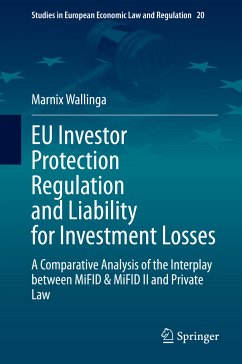Moreover, the book challenges the view that civil courts are - or should be - forced to give private law effects to violation of the MiFID and MiFID II conduct of business rules in line with the subordination model. Instead, the complementarity model is advanced as the preferred approach to this interaction in view of what MiFID and MiFID II require from Member States in terms of their implementation, as well as the desirability of each model. This model presupposes that courts should consider the conduct of business rules when adjudicating individual disputes, while preserving the autonomy of private law norms governing liability of investment firms towards clients.
Based on analysis of case law of courts in Germany, the Netherlands and England & Wales, as well as scholarly literature, the book also compares the available causes of action, the conditions of liability and the obstacles investors face when claiming damages, as well as how and the extent to which investors can benefit from the conduct of business rules in clearing these obstacles. In so doing, under the approach adopted bynational courts to the interplay between the conduct of business rules of EU origin and private law, the book shows how investors can benefit from the influence of these rules on private law norms. In closing, it demonstrates a hybridisation of private law remedies resulting from the accommodation of the conduct of business rules into the private law discourse according to the complementarity model, illustrating how judicial enforcement through private law means may contribute to investor protection.
Dieser Download kann aus rechtlichen Gründen nur mit Rechnungsadresse in A, B, BG, CY, CZ, D, DK, EW, E, FIN, F, GR, HR, H, IRL, I, LT, L, LR, M, NL, PL, P, R, S, SLO, SK ausgeliefert werden.









